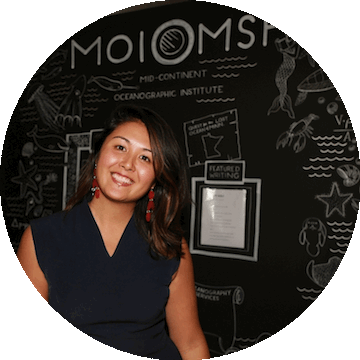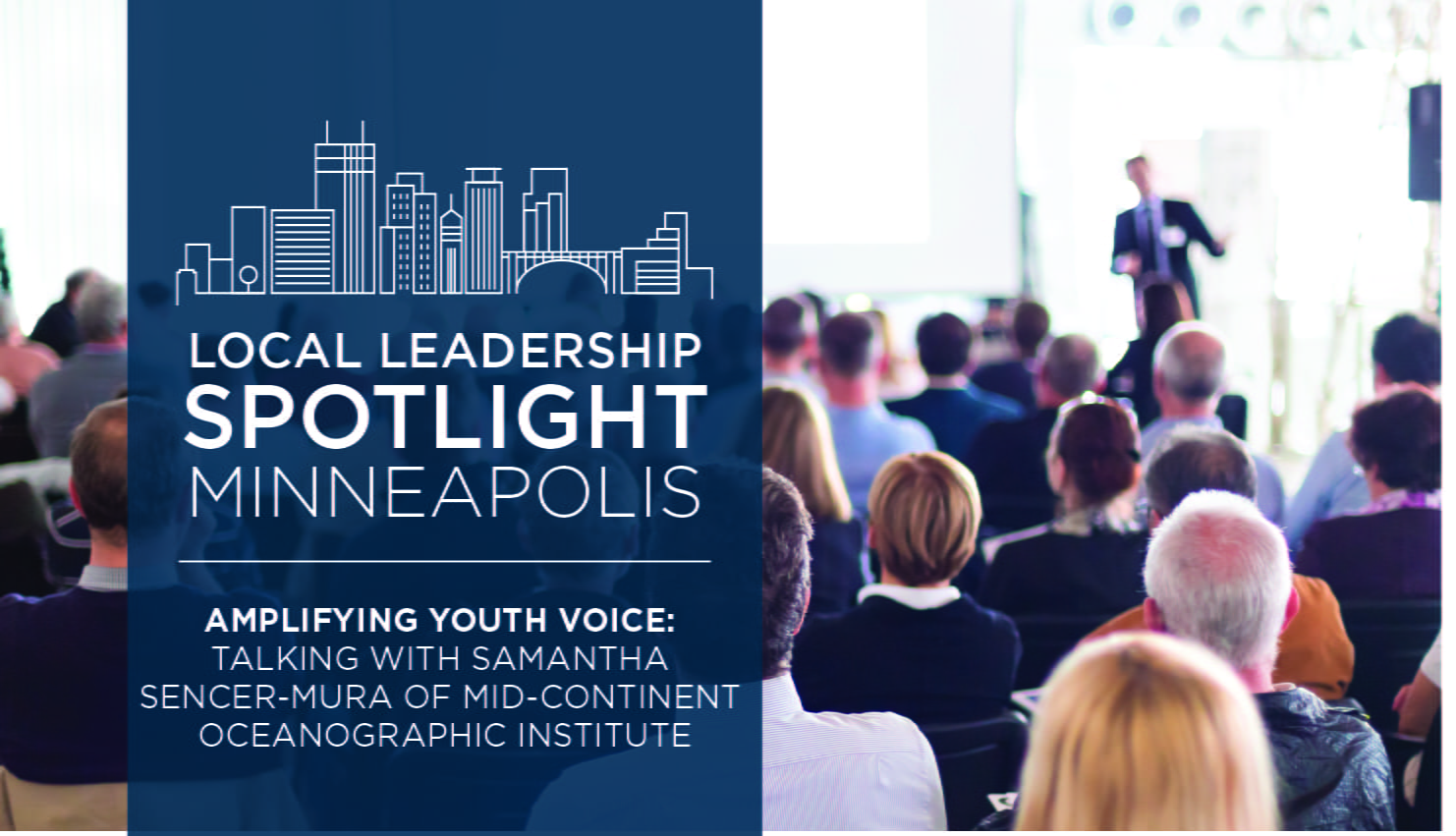Amplifying youth voice: Talking with Samantha Sencer-Mura of Mid-Continent Oceanographic Institute (MOI)
 Samantha Sencer-Mura is executive director of Mid-Continent Oceanographic Institute (MOI), a Minneapolis-based non-profit that empowers underserved K-12 students to think creatively, write effectively, and succeed academically alongside a community of caring volunteers.
Samantha Sencer-Mura is executive director of Mid-Continent Oceanographic Institute (MOI), a Minneapolis-based non-profit that empowers underserved K-12 students to think creatively, write effectively, and succeed academically alongside a community of caring volunteers.
What do you want readers who are unfamiliar with MOI to know about your organization?
I always start with our wacky name. We are a creative writing and tutoring organization in disguise. We believe having a fun, whimsical theme sparks surprise, curiosity, and creativity among the youth we serve, who are from low-income communities and may not come in having had a positive relationship with the school system. By surprising them from the first moment of interaction and then engaging them in a fun theme – the search for the lost ocean of Minnesota – we are welcoming them to an entirely new educational experience.
We are inspired by and partly connected with a national organization called 826 National, founded in 2002 by author Dave Eggers and educator Nínive Calegari and named for the first center’s address, 826 Valencia in San Francisco’s Mission district. Because the building was zoned for retail, the founders had to develop a proposal to sell something. They thought the building looked like a pirate ship, so they developed it into a pirate supply store with a creative writing and tutoring center in the back. The concept turned out to be a great entrée for engaging the community and fundraiser for the organization. There are now eight centers around the United States, each with a unique creative theme – others include spies and superheroes – that inspires the youth served and provides a focal point for the associated retail activity.
Why do you focus on writing?
We believe writing is a transformative socio-emotional tool. Seeing that people care about your story is a tremendous boost to confidence and self-worth. Writing skills are also critical for preparing today’s youth for the workforce. Regardless of what you do professionally, the ability to write is an asset. Our public schools are not doing a good job of developing writing skills, particularly in disadvantaged communities. As a result, American businesses spend $3 billion per year on remedial writing training.
We have a thriving business community with many established Fortune 500 companies, as well as new technology enterprises moving in. There are great job opportunities here, and we want to help make sure our local workforce of the future is prepared to flourish in those jobs.
What is the biggest challenge facing non-profits like MOI in Minneapolis?
Growth is a challenge for all non-profits, especially smaller organizations. To grow, we must balance being responsive to the needs of our community today – which, in our case, is about filling achievement gaps in the educational outcomes of students of color – with being visionary and proactive about where we want to be in the future. We need those moments to think about how our organizations will move forward, but that is hard to do when you are wrapped up in the day to day.
What are the most exciting trends or opportunities for solving the opportunity gap for low income students of color?
One exciting trend is a move toward more youth representation in leadership. I see non-profits doing things like creating youth advisory boards and appointing youth on their boards of directors or putting them in positions where they help make decisions, such as budgetary choices. When leadership is more representative of the people served, the organization will be more effective.
I am thinking about how role of youth in our organization will evolve over time. We are very good at amplifying youth voice through our publishing, but I think we can do more to lift youth voice within our organization and help us set our future direction. For example, how can they help us make decisions about programming? If we open another center in Minneapolis, where would it be?
As technology consultants, we are interested in how technology impacts non-profits and the communities they serve. How does MOI use technology to further its mission?
This is an interesting time for an organization that is largely devoted to publishing voices through the written word. There is a lot of conversation about whether print is dead. While we are working with a generation that does everything on the phone and uses iPads in the classroom, we believe books still play an important role. There is no replacement for holding a physical book with your name in print – sharing it with your grandparents or displaying it on the mantle.
That said, technology does offer new opportunities for helping us amplify youth voice. We have started to work with podcasting. We held a workshop to teach youth the art of storytelling through spoken words that can be shared through this medium. There are other opportunities to explore – for example, movie making or coding to create a game that tells a story. The key is to balance using new media while still treasuring the written word and paper books.
Behind the scenes, technology is very important to our mission. It is helping us connect more effectively in the community and get our message out. We have a retail store at our site that sells student publications and ocean-themed goods, and the revenue is vital to funding our non-profit activity. We recently worked with West Monroe to think about how to build on our retail presence and how technology can help us do so efficiently.
How can the Minneapolis business community engage with MOI?
Business partnerships are vital to bridging the skill gaps in our community. Businesses provide us with the support we need to further our mission and develop essential writing skills, and businesses benefit from a future talent pool better equipped with the skills they need.
Funding is, of course, one way to support non-profits such as ours. But there are also many small ways to engage with and support our mission, especially volunteerism. We would love more volunteers from the corporate community who can bring a different lens to what we do. For example, we prepare high school juniors and seniors for the college application process by working with them on personal essay writing. Volunteers from the local business community would bring great perspectives to students navigating that process.
What's your favorite thing about living and working in Minneapolis?
I grew up here but lived on both coasts for most of my 20s. We have a lot of the things that attract people to big urban areas – the food, the theater, the culture – but with the benefits of being a smaller city. I feel we have a real opportunity to make change in this community, and the smaller scale makes it easier to network and to take on challenges such as ours.
To read more about MOI and West Monroe check out the MOI Case Study.


